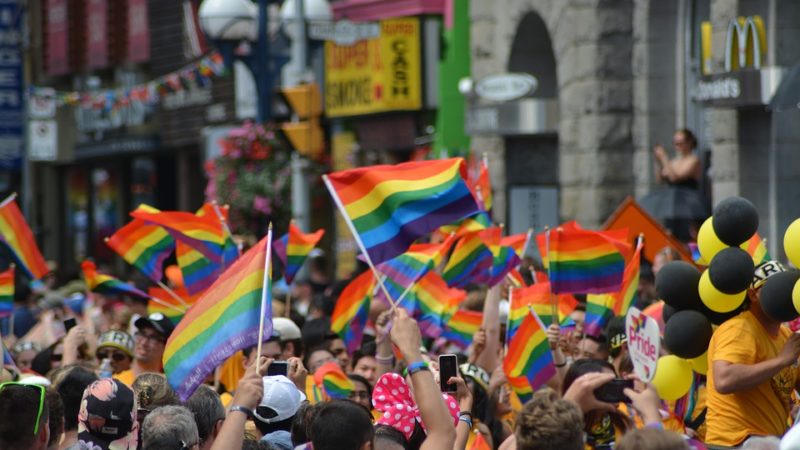Northern Irish LGBT+ people are still treated as second-class citizens

Since the Northern Irish assembly collapsed in January 2017, the region has been ruled directly by the UK government in Westminster.
For LGBT people and our fight for equality, this presented an opportunity. At a Pride reception at Downing Street in 2017, Theresa May said:
“I want all British citizens to enjoy the fullest freedoms and protections. That includes equal marriage. Now with devolution in the UK, that is not a decision for the UK Government to make. But my position is very clear. I think that LGBT people in Northern Ireland should have the same rights as people across the rest of the UK”
Instead of 2018 being a year of progress though, Theresa May has proven her government to be complicit in extending the intact legacy of Northern Irelands anti-LGBT+ legislation.
In 2018, Northern Irish LGBT+ people are still waiting for equal marriage.
This is not because equal marriage is unpopular among the public. An April 2018 poll showed that 70% support equal marriage, against just 18% who are opposed.
It’s popluar among the members of the now-collapsed Stormont Northern Irish Assembly too. At least fifty-five out of its ninety members have shown public support for the introduction of marriage equality legislation.
Yet the Northern Irish Assembly did not introduce marriage equality and the UK government has not either.
This is despite the efforts of Labour MP Connor Mcginn in 2018, who tried to introduce an amendment which would bring marriage equality to Northern Ireland.
This amemdment was torpedoed by Conservative MP Christopher Chope and the UK government did not introduce it, suggesting that they are simply an extension at Westminster level of the Democratic Unionist Party.
When marriage is repeatedly denied to LGBT+ people in Northern Ireland, it shows how relationships which are not the ‘traditional marriage between a man and a woman’ are not respected or valued.
July 2018 also saw the eagerly awaited LGBT Action Plan in which the government made some poorly funded promises on areas such as LGBT+ health, education, the workplace and international issues.
Even in this weak action plan, there was a sting for Northern Ireland on the penultimate page the of plan, where it stated that the plan was to have “varying levels of effect across the four nations of the UK, owing to existing devolution arrangements”. This effectively means that Northern Irish LGBT+ rights are put indefinitely on hold.
This is particularly bad because the Norther Irish assembly has never published its sexual orientation strategy, which it has been promising to publish for 12 years.
Without this strategy and without the LGBT Action Plan applying to Northern Ireland, LGBT+ people will be left even further behind the rest of the UK.
2018 was also the year of the ‘gay cake case’ in which a baker refused to make a cake with the words ‘support gay marriage’ on it, sparking a court case on whether the baker’s actions were discriminatory.
After four years of debate, in 2018 the Supreme Court found that the bakers had not discriminated.
The next week, a “No Irish, No Gay” banner appeared on a motorway bridge in Northern Ireland.
This shows the Supreme Court decision has emboldened those in Northern Ireland who have an agenda of discrimination and hate.
While some have argued that the bakers should be free to follow their conscience, in fact they have been granted the freedom to discriminate.
Another sign of discrimination in Northern Ireland was the revelation that same-sex couples are much less likely to be allowed to adopt in Northern Ireland as they are in the rest of the UK.
So 2018 has shown that the government in Westminster are seemingly OK with existing homophobic legislation in Northern Ireland.
This is not that much of a surprise. After all, this is the party that brought in Section 28, which banned the “promotion of homosexuality” by local authorities and in Britain’s schools.
The same party now presides over the deliberate treatment of Northern Irelands LGBT+ population as second class citizens in the UK.
Devolution is not a ‘get-out clause’ for the UK government anymore. It’s time for the government in Westminster to end the treatment of LGBT+ people in Northern Ireland as second class citizens, time do the right thing!
Claire Mullaly is a Belfast based trade unionist and member of the TUC LGBT+ Committee
To reach hundreds of thousands of new readers we need to grow our donor base substantially.
That's why in 2024, we are seeking to generate 150 additional regular donors to support Left Foot Forward's work.
We still need another 117 people to donate to hit the target. You can help. Donate today.



